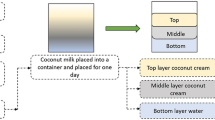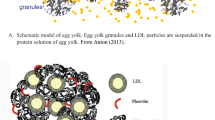Abstract
Lysophosphatidylcholine (LPC) possesses excellent oil-in-water emulsifying properties and health benefits. The objective of this study was to produce an LPC-enriched fraction from lysolecithin generated during enzymatic degumming of crude canola oil. Three alcohols (methanol, ethanol and isopropanol) were evaluated for their effectiveness at enriching LPC. A 3 × 3 full factorial design was employed to study the effects of two processing parameters (temperature and alcohol/lysolecithin ratio) on three responses (yield and LPC concentration of alcohol soluble fraction, and LPC recovery) with the most effective alcohol. Ethanol was found to be the best solvent to enrich LPC in lysolecithin. An ethanol soluble fraction with more than 50 % LPC was produced. Quadratic models with R 2 > 0.9 were developed to describe the relationship between the processing parameters and the responses in the 3 × 3 full factorial experiment. Both ethanol soluble fraction yield and LPC recovery increased with increasing temperature and ethanol/lysolecithin ratio. LPC concentration in the ethanol soluble fraction was enhanced with decreasing temperature and ethanol/lysolecithin ratio. According to the analysis, ethanol soluble fractions with LPC concentration higher than 66 % could be obtained at temperatures of 0–40 °C and an ethanol/lysolecithin ratio of 2:1 (v/w).


Similar content being viewed by others
References
D’Arrigo P, Servi S (2010) Synthesis of lysophospholipids. Molecules 15:1354–1377
Parrill AL (2008) Lysophospholipid interactions with protein targets. Biochim Biophys Acta 1781:540–546
Karliner JS (2004) Mechanisms of cardioprotection by lysophospholipids. J Cell Biochem 92:1095–1103
Chun J (2005) Lysophospholipids in the nervous system. Prostag Oth Lipid M 77:46–51
Koo SI, Noh SK (2001) Phosphatidylcholine inhibits and lysophosphatidylcholine enhances the lymphatic absorption of α-tocopherol in adult rats. J Nutr 131:717–722
Nakano T, Inoue I, Katayama S, Seo M, Takahashi S, Hokari S, Shinozaki R, Hatayama K, Komoda T (2009) Lysophosphatidylcholine for efficient intestinal lipid absorption and lipoprotein secretion in Caco-2 cells. J Clin Biochem Nutr 45:227
Sugawara T, Kushiro M, Zhang H, Nara E, Ono H, Nagao A (2001) Lysophosphatidylcholine enhances carotenoid uptake from mixed micelles by Caco-2 human intestinal cells. J Nutr 131:2921–2927
Christie WW (2014) Phosphatidylcholine and related lipids. http://lipidlibrary.aocs.org/Lipids/pc/index.htm. Accessed Jun 2014
Mine Y, Chiba K, Tada M (1993) Effect of phospholipids on conformational change and heat stability of ovalbumin. Circular dichroism and nuclear magnetic resonance studies. J Agr Food Chem 41:157–161
Nieuwenhuyzen WV, Tomás MC (2008) Update on vegetable lecithin and phospholipid technologies. Eur J Lipid Sci Tech 110:472–486
AOCS (2003) Official methods and recommended practices, 5th edn. AOCS, Champaign
Smiles A, Kakuda Y, MacDonald B (1989) Effect of degumming reagents on the composition and emulsifying properties of canola, soybean and sunflower acetone insolubles. J Am Oil Chem Soc 66:348–352
Patil VV, Galge RV, Thorat BN (2010) Extraction and purification of phosphatidylcholine from soyabean lecithin. Sep Purifi Technol 75:138–144
Cabezas D, Diehl B, Tomás M (2009) Sunflower lecithin: application of a fractionation process with absolute ethanol. J Am Oil Chem Soc 86:189–196
Author information
Authors and Affiliations
Corresponding author
About this article
Cite this article
Xie, M., Dunford, N.T. Enrichment of Lysophosphatidylcholine in Canola Lysolecithin. J Am Oil Chem Soc 92, 287–293 (2015). https://doi.org/10.1007/s11746-015-2593-8
Received:
Revised:
Accepted:
Published:
Issue Date:
DOI: https://doi.org/10.1007/s11746-015-2593-8




